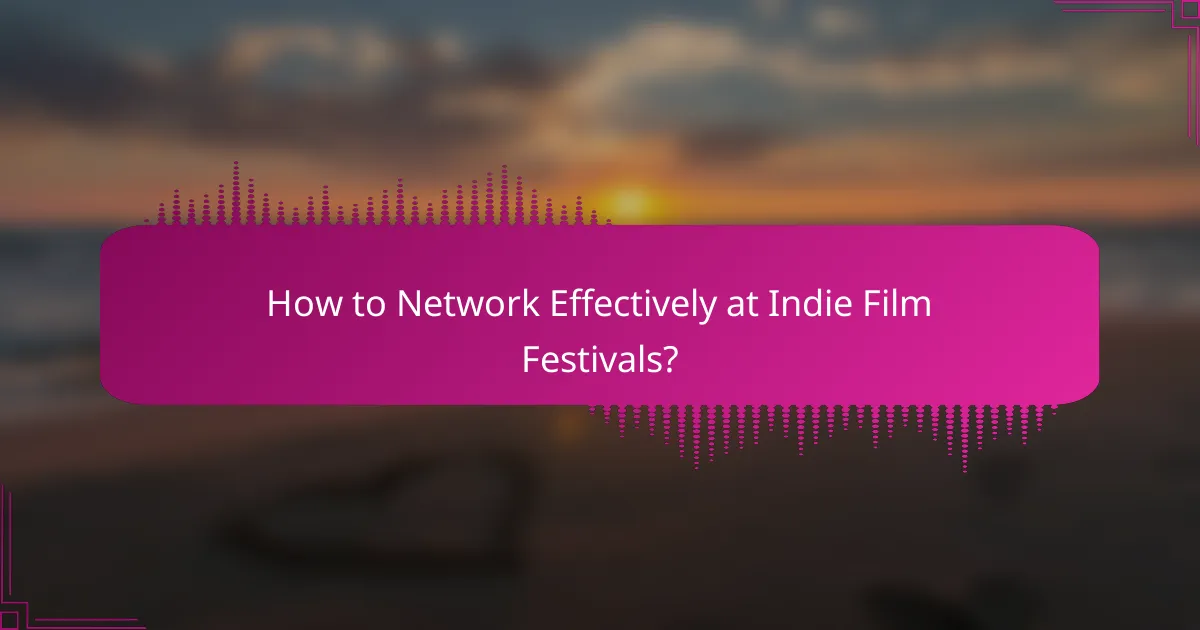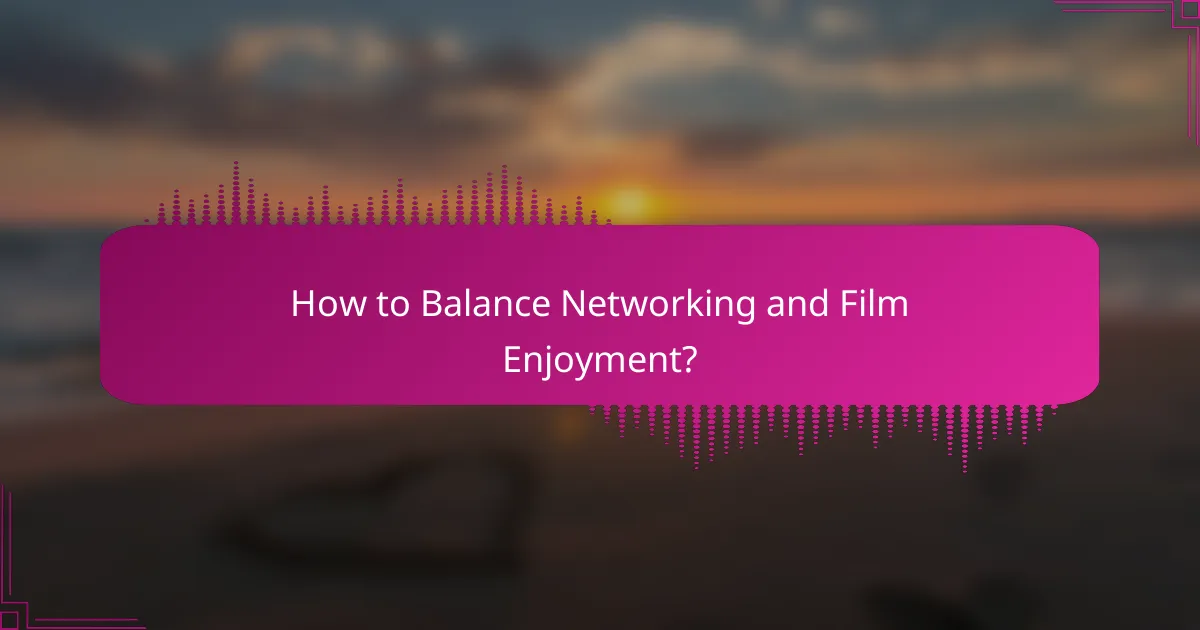Indie film festivals offer a unique blend of cinematic enjoyment and networking opportunities for filmmakers and industry professionals. By attending these events, participants can immerse themselves in a diverse array of independent films while forging valuable connections within the industry. Balancing the enjoyment of screenings with strategic networking requires thoughtful planning and prioritization to make the most of the experience.

How to Network Effectively at Indie Film Festivals?
Networking at indie film festivals involves building relationships with industry professionals while enjoying the films. Focus on making genuine connections, sharing your passion for cinema, and leveraging opportunities to meet others in the field.
Attend networking events
Networking events are specifically designed for attendees to meet and connect. Look for mixers, receptions, or organized meet-and-greets that often accompany festival screenings. These gatherings provide a relaxed atmosphere to strike up conversations with filmmakers, producers, and fellow enthusiasts.
Be prepared with a brief introduction about yourself and your interests in film. Consider bringing business cards to share your contact information easily.
Engage in panel discussions
Panel discussions offer insights into industry trends and allow you to interact with speakers and attendees. Participate actively by asking questions or sharing your thoughts, which can help you stand out and make connections with like-minded individuals.
After the panel, approach the speakers for further discussion. This can lead to valuable contacts and potential collaborations.
Utilize social media platforms
Social media is a powerful tool for networking at film festivals. Use platforms like Twitter, Instagram, and LinkedIn to connect with other attendees and share your festival experiences. Follow festival hashtags to engage with the community and discover new contacts.
Post about films you enjoy and tag filmmakers or industry professionals to initiate conversations. This can enhance your visibility and help you establish connections beyond the festival.
Follow up with contacts
After meeting someone, follow up within a few days to reinforce the connection. Send a brief message expressing your enjoyment of the conversation and mentioning any shared interests. This keeps you fresh in their mind and opens the door for future interactions.
Consider connecting on LinkedIn or other professional networks to maintain the relationship over time.
Join local film groups
Joining local film groups can expand your network beyond the festival. Look for organizations or clubs that focus on independent cinema, where you can meet others who share your passion for film.
Participate in group activities, screenings, or workshops to build relationships and gain insights into the local film scene. This can lead to collaborative opportunities and a deeper understanding of the industry.

What Are the Best Indie Film Festivals in the US?
The best indie film festivals in the US showcase a diverse range of independent films while providing valuable networking opportunities for filmmakers and industry professionals. Key festivals include Sundance, SXSW, Tribeca, and the Seattle International Film Festival, each offering unique experiences and access to different audiences.
Sundance Film Festival
The Sundance Film Festival, held annually in Park City, Utah, is one of the most prestigious indie film festivals in the world. It typically features hundreds of films, including documentaries, shorts, and feature-length narratives, attracting filmmakers, critics, and audiences alike.
Attending Sundance can be a significant opportunity for networking, as many industry leaders and influencers are present. However, securing tickets can be competitive, so plan ahead and consider purchasing passes early to gain access to screenings and events.
South by Southwest (SXSW)
SXSW, located in Austin, Texas, is a multifaceted festival that combines film, music, and interactive media. This festival is known for its vibrant atmosphere and diverse programming, which includes premieres of independent films alongside panels and networking events.
To make the most of SXSW, prioritize your schedule by selecting key screenings and events that align with your interests. Engage with filmmakers and industry professionals during networking sessions, and take advantage of the festival’s interactive components to expand your connections.
Tribeca Film Festival
The Tribeca Film Festival, founded in 2002 in New York City, focuses on celebrating independent storytelling and fostering emerging talent. It features a wide array of films, including international selections, and often includes discussions and Q&A sessions with filmmakers.
For attendees, Tribeca offers a chance to experience films in a vibrant urban setting. Networking opportunities abound, so be proactive in attending panels and social events. Consider participating in workshops to enhance your skills and meet like-minded individuals.
Seattle International Film Festival
The Seattle International Film Festival (SIFF) is one of the largest film festivals in the US, showcasing a diverse selection of films from around the globe. It typically runs for several weeks and includes screenings, workshops, and special events.
To navigate SIFF effectively, familiarize yourself with the festival schedule and prioritize films that resonate with your interests. Engage with filmmakers during post-screening discussions, and take advantage of the festival’s community-oriented atmosphere to build connections within the indie film scene.

How to Balance Networking and Film Enjoyment?
Balancing networking and film enjoyment at an indie film festival requires careful planning and prioritization. By setting a schedule, prioritizing key screenings, and engaging with filmmakers, you can maximize both your professional connections and your cinematic experience.
Set a schedule
Creating a detailed schedule is essential for balancing networking and film enjoyment. Identify the festival’s program and mark the screenings you want to attend alongside networking events. Use a digital calendar or a simple notebook to keep track of your commitments.
Consider allocating specific time blocks for networking activities, such as meet-and-greets or panel discussions, while ensuring you leave ample time for film screenings. This approach helps you stay organized and prevents last-minute decisions that could lead to missing important films.
Prioritize key screenings
To make the most of your festival experience, prioritize screenings that align with your interests or professional goals. Research films in advance, focusing on those that have received buzz or feature filmmakers you admire. Aim to attend a mix of well-reviewed films and hidden gems.
Additionally, consider the timing of screenings. Popular films may draw larger crowds, making it harder to network afterward. If possible, choose less crowded screenings to facilitate conversations with fellow attendees and filmmakers.
Engage with filmmakers
Engaging with filmmakers can enhance your festival experience and create valuable connections. Attend Q&A sessions after screenings to ask questions and express your thoughts on their work. This interaction can lead to meaningful conversations and networking opportunities.
Don’t hesitate to introduce yourself to filmmakers during informal settings, such as after-parties or networking events. Be genuine in your approach, and share your appreciation for their films. Building rapport with creators can open doors for future collaborations or insights into the industry.

What Are the Benefits of Attending Indie Film Festivals?
Attending indie film festivals offers numerous advantages, including exposure to innovative films, networking opportunities, and insights into the latest industry trends. These events create a unique environment where filmmakers, enthusiasts, and industry professionals can connect and share their passion for cinema.
Access to unique films
Indie film festivals showcase a diverse range of films that often differ significantly from mainstream offerings. Attendees can discover fresh storytelling styles, innovative techniques, and unique perspectives that may not be available through traditional distribution channels.
Many indie films feature emerging talent, providing a platform for new voices and ideas. This access allows viewers to experience groundbreaking narratives and artistic expressions that challenge conventional filmmaking norms.
Opportunities for collaboration
Networking at indie film festivals can lead to valuable collaborations among filmmakers, actors, and industry professionals. These events often host panels, workshops, and informal gatherings where attendees can meet potential partners for future projects.
By engaging with others in the industry, filmmakers can share resources, exchange ideas, and even find funding opportunities. Building these connections is crucial for anyone looking to advance their career in the film industry.
Exposure to industry trends
Indie film festivals serve as a barometer for emerging trends in cinema, allowing attendees to stay informed about what is resonating with audiences. Observing the types of films that gain traction can provide insights into shifting viewer preferences and industry dynamics.
Additionally, discussions with filmmakers and industry experts at these festivals can reveal the latest techniques, technologies, and distribution methods shaping the future of film. This knowledge is essential for anyone looking to remain competitive in the evolving landscape of the film industry.

What Should You Prepare Before Attending?
Before attending an indie film festival, it’s essential to prepare by familiarizing yourself with the event’s schedule, the films being showcased, and the filmmakers involved. This preparation will enhance your experience, allowing you to network effectively while enjoying the films.
Research films and filmmakers
Understanding the films and filmmakers featured at the festival is crucial for making informed choices about what to watch and who to connect with. Look up the festival program to identify films that align with your interests, and take note of the directors, writers, and producers behind them.
Consider watching trailers or previous works by the filmmakers to gauge their style and themes. This background knowledge can spark meaningful conversations during networking opportunities, allowing you to discuss specific aspects of their work and express genuine interest.
Additionally, create a shortlist of films you want to see, prioritizing those that resonate with your personal tastes or professional goals. This focused approach will help you manage your time effectively during the festival and ensure you don’t miss key screenings.
